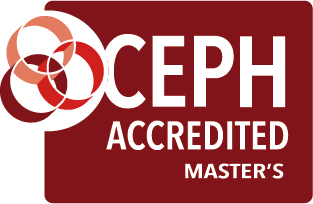The MPH degree, with a concentration in Interprofessional Public Health Practice, can be earned by completing 48 graduate credits, consisting of
Foundational Courses (15 credits):
- PUBH 5403 health Administration
- PUBH 5404 Environmental Health
- PUBH 5405 Social & Behavioral Foundations of Public Health
- PUBH 5408 Epidemiology & Biostatistics I
- PUBH 5409 Epidemiology & Biostatistics II
Concentration Courses (9 credits):
- PUBH 5406 Law and Public Health
- PUBH 5411 Introduction to Interprofessional Public Health Practice
- PUBH 5431 Public Health Research Methods
Applied Practice Experience (6 credits):
- PUBH 5407 Practicum in Public Health (2 semesters)
Integrative Learning Experience* (3 credits):
- PUBH 5499 Capstone Project
Elective Coursework (15 credits)
* Students desiring a research-focused MPH may petition the program to substitute a 9-credit GRAD 5950 Master’s Thesis and 3 electives for PUBH 5499 Capstone Project and 5 electives. Permission to complete a thesis is contingent on a student documenting ‘readiness’ to undertake thesis-related work as defined by their mastery of appropriate technical skills, substantive knowledge of subject matter in question and a thorough understanding of thesis requirements and timelines (at least 2 semesters prior to graduation must be evident).
How to Apply
Admission to the MPH program is competitive. Prospective students must present evidence of strong undergraduate academic performance in a relevant discipline. Those with experience and knowledge of the U.S. public health system are preferred.
To be considered, your application should include:
- A personal statement that summarizes your career plans and what has influenced your decision
- Official transcripts
- Three letters of recommendation
Submit your application here
Suggested Standalone Full-time Plan of Study:
| Fall Term | Spring Term | ||
| Year 1 | PUBH 5403 Health Administration
PUBH 5408 Epidemiology/Biostatistics I PUBH 5411 Intro to Interprofessional Practice PUBH Elective |
PUBH 5404 Environmental Health
PUBH 5405 Social and Behavioral Foundations of Public Health PUBH 5409 Epidemiology/Biostatistics II PUBH 5431 Public Health Research Methods |
|
| Year 2 | PUBH 5406 Law and Public Health
PUBH 5407 Practicum in Public Health PUBH Elective PUBH Elective |
Plan A Thesis | Plan B Non-thesis |
| PUBH 5407 Practicum
GRAD 5950 Thesis Research (9 cr.) |
PUBH 5407 Practicum
PUBH Elective PUBH Elective PUBH 5499 Capstone Project |
||
Suggested Standalone Part-time Plan of Study:
| Fall Term | Spring Term | |
| Year 1 | PUBH 5408 Epidemiology/Biostatistics I
PUBH 5411 Intro to Interprofessional Practice |
PUBH 5405 Social and Behavioral Foundations of Public Health
PUBH 5409 Epidemiology/Biostatistics II |
| Year 2 | PUBH 5403 Health Administration
PUBH 5406 Law and Public Health |
PUBH 5404 Environmental Health
PUBH 5431 Public Health Research Methods |
| Year 3 | PUBH 5407 Practicum in Public Health
PUBH Elective |
PUBH 5407 Practicum in Public Health
PUBH Elective |
| Year 4 | PLAN A Thesis | |
| PUBH Elective
GRAD 5950 Thesis Research (3 cr.) |
GRAD 5950 Thesis Research (6 cr.)
|
|
| PLAN B Non-thesis | ||
| PUBH Elective
PUBH Elective |
PUBH Elective
PUBH 5499 Capstone Project |
|
Epidemiology:
- Infectious Disease Epidemiology
- Intermediate Epidemiology
- Public Health Issues in Genetics
- Epi of Substance Abuse Disorders & Psychiatric Co-Morbidities
- Chronic Disease Control
- Epidemiology of Disabilities
Environmental health:
- Environmental Health and Ethical Decision-Making
- Occupational & Environmental Epidemiology
Social sciences:
- Health Education
- Food, Health and Politics
- Social Inequality and Health Disparities
- International Health
- Public Health Nutrition
- Foundations of Public Health in Disabilities
Quantitative methods:
- Critical Reasoning in Design of Population Health Research
- Biostatistical Methods in Clinical Research
- Topics in Intermediate Biostatistics
Law and ethics:
- Human Rights and Health
- Disability Law, Policy, Ethics and Advocacy
- Public Health Ethics
Health administration:
- Foundations of Public Health and Disability
- Public Health Agencies
- Women, Public Health and Reproduction
- Comparative Health Systems
- Alcohol and Drug Policy Research
- Public Health and Policy in an Aging Society
- Health Program Evaluation

